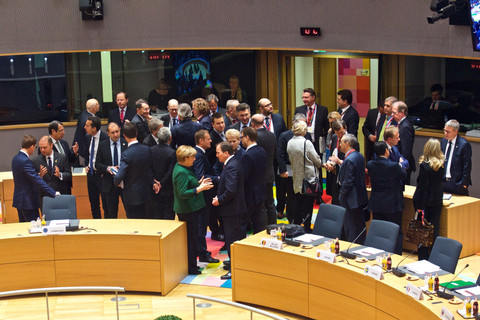With
the ceremonial signing of the Rome Declaration on Saturday (25 March), the
so-called Bratislava process designed to rethink the EU after the shocking
Brexit vote last year has come to an end.
The
result is a fragile display of unity, with simmering tensions and deep divisions
on policies among the member states.

For now, no more summits are planned on the future of Europe. (Photo: Council of the European Union)
Last September, the EU-27 held their first
soul-searching meeting in Bratislava in an effort to reconnect with
citizens and make the bloc more responsive to their needs and
concerns.
Migration, strengthening the EU’s external borders, deeper defence
cooperation, and the need to reinforce the European economy after the bruising
eurocrisis and subsequent austerity measures emerged as key points of
agreement.
The common objectives were designed to allow the bloc to “rebuild a sense
of political community”, European Council president Donald Tusk said at the
time.
Minimum agenda
There was of course a very tangible and pressing political need to show
unity after Brexit - that is not to be underestimated. The message was that
however unprecedented it was for a member state to leave the union, it would not
shake the bloc.
Therefore, the sheer show of unity is a result not to be downplayed
politically.
But there seems to be little more, for now, that leaders could
wholeheartedly agree on.
Already in Bratislava, the then Italian prime minister, Matteo Renzi,
embattled at home and needing to put up a fight, refused to hold a press
conference together with French president Francois Hollande and German
chancellor Angela Merkel. He said that the meeting was a waste of
time.
Renzi’s outburst might have been aimed more at Italian voters rather than
at the EU itself. Just like the
last-minute objections from Poland and Greece to the Rome Declaration last
week were more for internal consumption, it shows that leaders cannot be counted
on for not using the EU as punchbag, whenever it suits them
politically.
And that puts unity at risk. EU
Observer.
.jpeg)